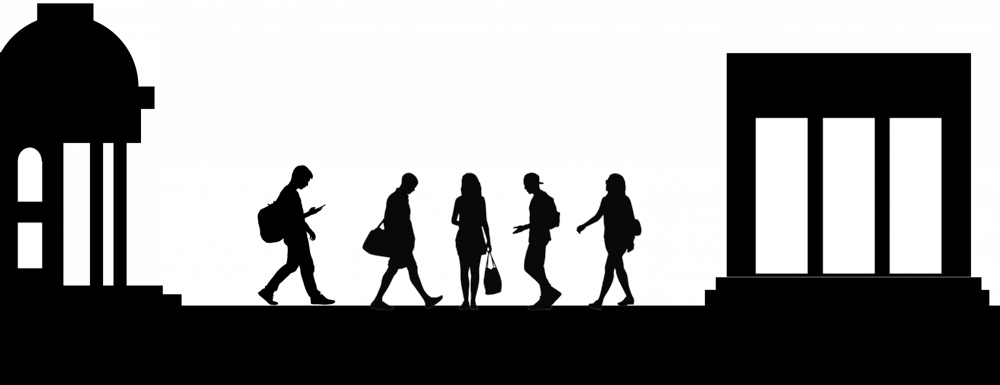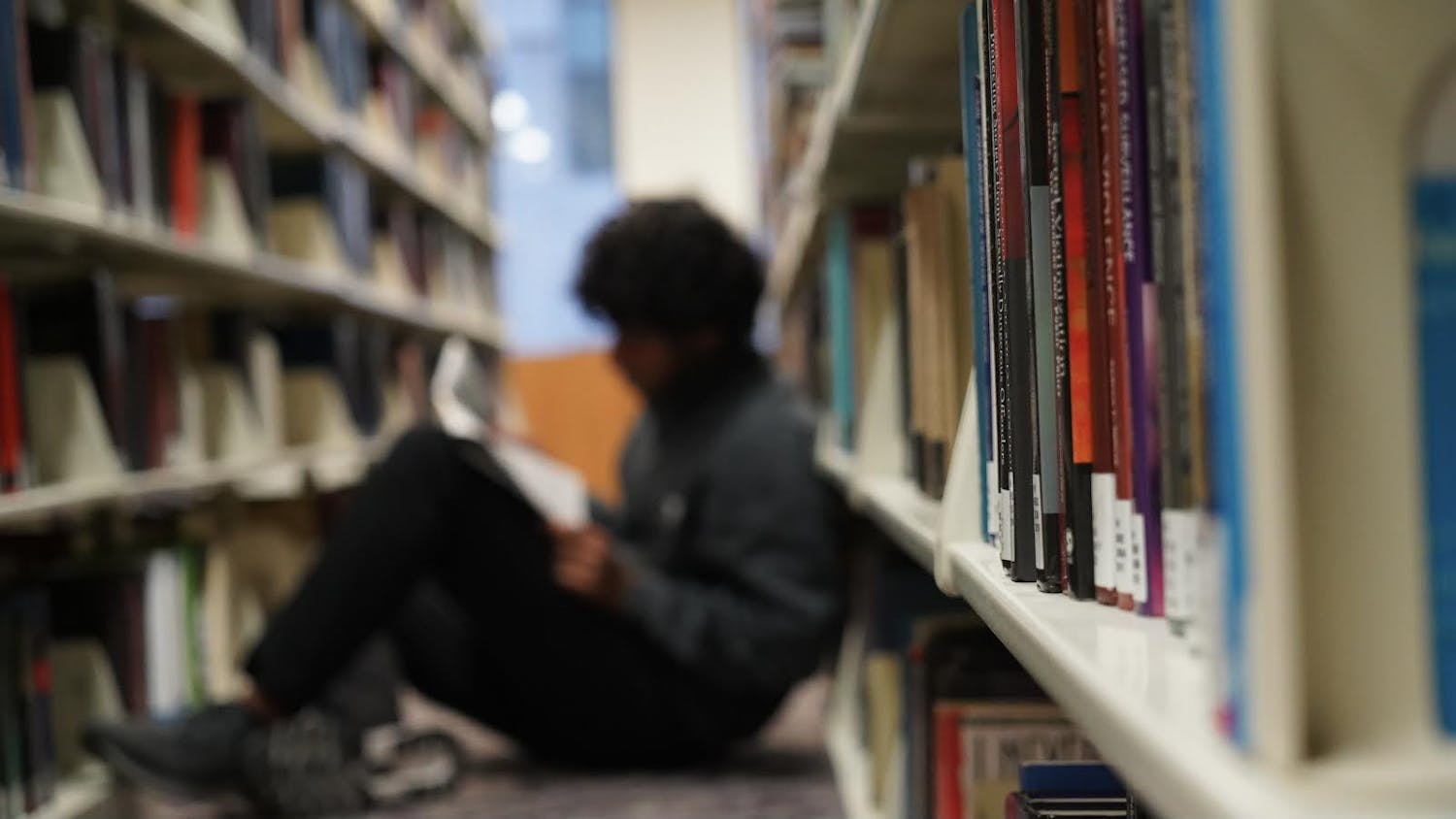From the Newsstands: This story appeared in our December 2021 print edition. You can find the digital version here.
Students walked onto campus early on the morning of Aug. 30 for the first day of in-person classes at American University since spring 2020.
For some, the walk across campus was familiar, but for others, it was an entirely new experience. From moving in, studying abroad and performing, students are still adjusting to what life at AU now looks like.
For Lilliana Silver, a sophomore in the School of Public Affairs and the College of Arts and Sciences, the experience of arriving on campus this fall to attend in-person classes was strange. Despite completing her freshman year at AU, she hadn’t been in a classroom since her senior year of high school.
“March came and [my high school’s administration] was like, ‘We’re going to go online for two weeks’ ... and then we did not go back, and now I’m a sophomore in college,” she said.
While most members of the class of 2024’s last experience in a classroom was just under two years ago, some non-traditional students like Kai Yuen Suherwan, a sophomore in the School of International Services, haven’t been in a classroom in three years. After graduating high school in 2018 and then enrolling in the Singaporean army for two years, the delay of another year of the college experience wasn’t expected.
“I would think about the typical American college experience, I would think about the parties, actually going to lecture halls and stuff, and I was looking at the School of International Service and I was like I can’t wait to go here,” Suherwan said. “But then contrast that with me sitting in the basement staring at a screen.”
Now that classes are in-person again, he said he can finally partake in some of the college experiences he’d hoped for. His excitement over being back in person is one that has been echoed by many.
“For the first time, I was able to look to my left and I had a student there,” said Jehane Djedjro, a sophomore in SIS. “I could talk to them about school and the material we’re learning. Mentally, it’s just brought me to a better place.”
What normalcy looks like has been a question that all students have faced in their return to campus this year. The two remaining classes — the class of 2022 and 2023 — are the only ones that have experienced the University pre-pandemic.
Victoria Guillen, a junior in SIS, said that the return to in-person learning came with a different campus experience than the one she recalled from her freshman year.
“Returning to campus, socially a lot of stuff changed for me,” Guillen said. “A lot of my friends from freshman year either graduated, took a gap year, transferred or dropped out. So everyone is in a completely different position than where we were before. And that’s been a lot to digest too.”
Borders begin to reopen and students look abroad
Guillen and many others were planning to study abroad in spring 2022, and while some programs are being offered in a limited capacity, many plans have been put on hold. For many, the opportunity to study abroad is what drew them to AU. According to U.S. News & World Report, AU is a top-ranked university for those wanting to study abroad. At some point during their time at the University, 54 percent of students will study abroad, the University’s website says. One of these programs is the Sakura Scholars program, where SIS students can spend two years abroad at Ritsumeikan University in Kyoto, Japan.
This year, Mizuki Brent, a sophomore Sakura Scholar, was the only member in their cohort allowed entrance to Japan through their Japanese citizenship to follow the program’s typical progression.
“I haven’t actually met any of my cohorts yet just because my whole freshman year was online, but I’ve been in touch with a couple of them on the phone,” Brent said. “It’s not that I really feel like I’ve been missing out on any friendships because I haven’t been able to meet them yet, but I’ve been able to meet some of the other kids [here in Japan].”
Brent said that AU isn’t the only university where students have felt disconnected during the pandemic. Ritsumeikan University just started allowing students to attend in-person classes due to low COVID-19 numbers.
“Classrooms are much emptier than normal, classes are mostly all hybrid, and there are a lot of kids in South Korea and China that can’t make it over,” Brent said.
Performing arts returns to the stage
While classrooms across the globe have begun to look more normal as campuses navigate COVID-19 protocols, auditoriums for the performing arts are still just starting to get live audiences back.
Nicole Klokiw, a senior in CAS, said that the University’s Department of Performing Arts looks very different under post-pandemic restrictions than it did before. Audience capacity is maxed at 50 percent, crew and orchestra members are masked and staging is socially distanced.
But after performing in two shows last year over Zoom, Klokiw said that even though in-person performances look different than they used to, she’s happy to be back on stage for this fall’s production of “The 25th Annual Putnam County Spelling Bee.”
“This is the first in-person show I’ve been in, in three years,” Klokiw said of the late October show. “Being able to look into the audience … is really nice. It’s pretty encouraging actually to see and hear people reacting. It makes me happy.”
Not all shows have been in person. Kelsey Walker, a junior in CAS said that this fall’s production of Shakespeare’s “A Winter’s Tale” is being filmed. While the decision was made in order to be able to accommodate the possibility of the University closing in-person shows, Walker said that the transition back to campus has still been difficult.
“I lost a lot of trust in the thing I love to do most, which is really hard to grapple with,” Walker said. “It’s hard to place trust in theater itself, or in an institution like AU when things change so constantly. And I know that you just have to deal with it, but it’s hard when you’re like ‘okay, this isn’t how it used to be, or this isn’t how I want it to be,’ ... Like that’s all I want to be doing, and I don’t really feel like we’re back yet.”
The uncertainty of what the future holds is a sentiment that all students share. With the pandemic still unfolding, students have learned to be flexible and how to deal with the challenges of living in unprecedented times. While what “normal” looks like will continue to change over time, AU students have proven resilient.





